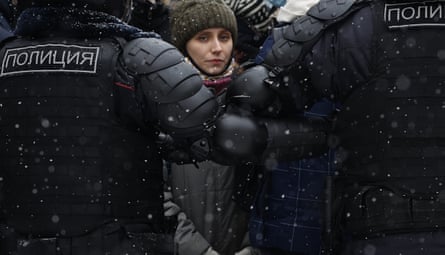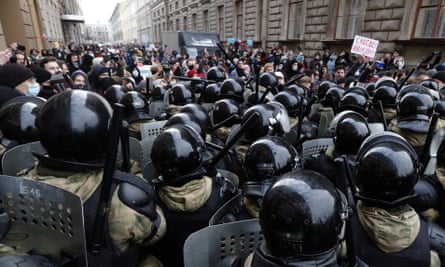Police have paralysed the centres of Russia’s largest cities, including Moscow, as the Kremlin sought to beat back rallies in support of jailed opposition leader Alexei Navalny, the country’s most significant protests in a decade.
Supporters of the Kremlin critic took to the streets to protest against his jailing, despite the biting cold and threat of arrest. At least 5,100 people, including Navalny’s wife, Yulia Navalnaya, were detained as the rallies across the country entered a second week.
Taking unprecedented security measures, riot police and national guards troops shut down seven central metro stations in Moscow and blocked off streets to prevent a repeat of last week’s record protests, some of the largest since 2012.
UK foreign secretary Dominic Raab accused authorities of detaining people “simply for expressing their dissent”, adding: “We condemn the Russian authorities’ indiscriminate and arbitrary arrest of peaceful protesters and journalists.
The unsanctioned protests deteriorated into a cat-and-mouse game as riot police armed with batons and stun guns pursued protesters through the capital. The hours-long chase was punctuated by clashes and brutal arrests. One man was severely injured after dousing himself with petrol and setting himself on fire, apparently in an act of protest. He was hospitalised in critical condition.

The threat of arrests and violence appeared to reduce the numbers in Moscow compared with last week. Forced out of the centre, a crowd of thousands chanting “Putin is a thief” marched toward Moscow’s Komsomolskaya Square, a major rail artery outside the security cordons, as police in body armour made hundreds of arrests.
Behind them sped dozens of armoured police vans used for mass arrests. “Moscow looks like a fortress today,” said Maria Lazareva, a protester who found herself trapped between two lines of riot police just off of Komsomolskaya Square. “They can stop us when there are not enough of us but as more come it’s going to be impossible to keep us penned in.”
Hundreds chanted “freedom!” as they continued toward the Matrosskaya Tishina jail in Moscow where Navalny is being held before a parole hearing this week that could lead to him being sent to prison for years. Navalny was arrested earlier this month after returning to Russia following a suspected FSB poisoning.
“He’s the only one willing to fight back and always say the truth,” said another protester, Dmitri. “Not everyone here agrees with him, but I think a lot [of people] respect him.”
Police in St Petersburg, Russia’s second-largest city, took similar security precautions, shutting down Nevsky Prospekt, the city’s main avenue, to prevent protesters from gathering there. But thousands still gathered on sidestreets and faced off with riot police, who beat truncheons against their metal riot shields in an effort to scare off crowds calling for Navalny’s release. The crowds responded by clapping.
St Petersburg, Russia.
— Matthew Luxmoore (@mjluxmoore) January 31, 2021
The soundtrack of the #Navalny protests pic.twitter.com/9YKg3OH4gI
For a second week running, police at moments appeared to be close to losing control of the situation. In Moscow, protesters ran out into the streets, blocking trafficand multiple videos showed police using stun guns to shock protesters, in one case until the victim lost consciousness. In St Petersburg, one police officer was filmed pulling a pistol on protesters after being kicked to the ground.
The Kremlin’s goal on Sunday was to show that it was ready to take extraordinary measures to prevent Navalny supporters from gathering in cities across the country. In many places, police chased the opposition leader’s supporters out of the city centre and into the outskirts. In Ekaterinburg, police made arrests on the frozen Iset River, and in Vladivostok, police followed protesters on to the frozen ice of the Amur Bay.

The Biden administration again condemned the crackdown on protests, marking a significant departure from the Trump White House. “The US condemns the persistent use of harsh tactics against peaceful protesters and journalists by Russian authorities for a second week straight,” said the US secretary of state, Antony Blinken. “We renew our call for Russia to release those detained for exercising their human rights, including Alexei Navalny.”
EU foreign policy chief Josep Borrell said he deplored the “widespread detentions and disproportionate use of force” against protesters and journalists.
On Sunday, police detained more than 5,100 people in cities nationwide, according to OVD-Info, a group that monitors political arrests, surpassing the 4,000 detentions at the demonstrations across Russia on 23 January, leaving many opposition supporters behind bars.
Police this week arrested Navalny’s senior aides for allegedly violating coronavirus restrictions during last week’s protests. The largely leaderless crowds in Moscow on Sunday were directed via the Telegram messaging app, which as of late Sunday afternoon had ushered them away from the jail back toward the city centre.
The remote directions were reminiscent of the protests in neighbouring Belarus, where Telegram channels opposed to the government of Alexander Lukashenko would direct protesters to sites around the city each week as the government clamped down. The harsh tactics used by police, who were filmed using stun guns on subdued protesters, kicking snow in the faces of demonstrators lying prone, and beating female protesters with batons, also appeared to be a calculated decision to wear down the demonstrators’ resolve.
To galvanise support at home, in an online video viewed more than 100m times, Navalny has accused Putin of being the ultimate owner of a sumptuous Black Sea palace, something he has denied. On the eve of the protests, Arkady Rotenberg, a businessman and Putin’s former judo sparring partner, said he owned the property.
New protests are expected on Tuesday if Navalny is sentenced to prison time. While street demonstrations reversed a prison sentence against him in 2013, analysts have said that the Kremlin is now less concerned with the potential opposition backlash or likely international condemnation.